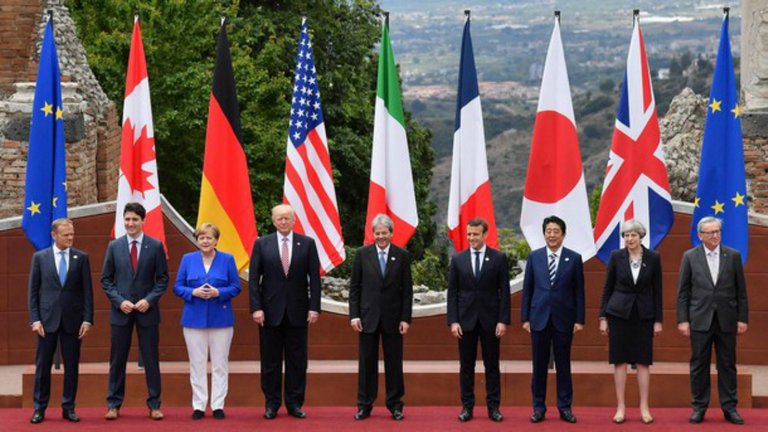
The upcoming week could be the most economically important for 2018. This shows a survey of Bank of America among its clients, quoted by Bloomberg.
High-level geopolitical summits, trade talks, and central bankers' sessions scheduled for the next few days may prove to be key to financial markets. Here's what's next:
Today, investors have been able to react to the news that came from the G7 meeting in Canada over the weekend. Most esters have identified the forum as a diplomatic failure because Donald Trump has accused his Big Seven allies of taking unfair advantage of their trade relationship with Washington.
He posts on Twitter, signed by other G7 respondents, after leaving the meeting earlier, due to his planned meeting with North Korean leader Kim Jong-nun in Singapore.
The question everyone is asking whether this new escalation of tension will lead to the introduction of additional trade barriers and sanctions? Canadian Prime Minister Justin Trudo was determined to respond to the United States' raising of tariffs on aluminum and steel, and the European Union is also preparing such a package of measures.
Moreover, trade was not the only cause for disagreement between the US president and other world leaders. He was embarrassed before the meeting in the Canal town of La Malbe after he said Russia should be accepted again in the group of seven.
But his idea was supported only by the new Italian Prime Minister Giuseppe Conte.
And while the US President's talks with his G-7 partners have ended (at least for now), those with Pyongyang are yet to come. Donald Trump and Kim Chen-zun will be talking for the first time in person, which will be the first official meeting at such a level in the history of the two countries.
Last week, Trump predicted "great successes" at this meeting, and even said it was possible to sign an agreement with Pyongyang to formally end the Korean War of 1950-1953.
On this foreign policy background in Washington, the US inflation figures will be published to show whether the US economy is still able to maintain strong growth rates or is already beginning to see some cooling.
In Europe the focus of attention on the second day of the week will fall on British Prime Minister Theresa May, and in particular on her attempts to pass through Parliament the legal framework of the upcoming Brexit.
It will be debated and voted once again in the lower House of Representatives after the House of Lords has tabled 15 separate amendments to the government bill. Some of them address key issues such as whether the UK will have to leave the European single market and the customs union.
It is expected that the debates will continue on Wednesday, and the vote in the lower house will be a test of May's and her party's ability to win supporters and compromise on how the final deal for Brexit will be between London and Brussels.
On the third day of the week, the US Federal Reserve is expected to announce the second rising interest rate this year. Institution Governor Jerome Powell will hold a press conference presenting the institution's updated forecasts for the country's economic development.
According to experts' consensus forecasts, Powell is likely to announce plans for four interest rises this year, or one more than those announced in March.
The Argentinian central bank will also be "under the spotlight" on Wednesday and will most likely keep the key interest rate at 40%, continuing its struggle to stabilize the peso course.
Italy will hold the first auction of government securities after the formation of the new populist government of the country, which promised dramatic increases in government spending. Three-, seven- and 30-year bonds will be offered at auction, and yields will be a test for the confidence of market participants.
However, the risks of the bond market are already visible as the "scissors" between the Italian and Spanish 10-year government bonds have expanded to their highest levels since 2012.
In the UK, inflation data will be published to guide Bank of England's possible action on interest rates and monetary incentives.
The European Central Bank is approaching the time it has to declare the end of its bond purchase program. At the institution's meeting on Thursday, it is expected for the first time to formally discuss the options for its finalization.
Around a third of economists and traders surveyed by Bloomberg believe that institution president Mario Draghi will announce the end date of the bond program as early as June 14, while 46% think he would prefer to wait until next month and only then he will reveal the details.
Meanwhile, Russian President Vladimir Putin and Saudi Prince Mohammed bin Salman will meet for the opening match of the World Cup between hosts from Russia and Saudi Arabia.
However, the sporting event may also be the occasion for talks on the topic of oil market cooperation. Especially since the meeting of the two leaders will take place only a week before the meeting of OPEC in Vienna, which will once again discuss the extraction quotas and their possible increase.
On the fourth day of the week, a series of key data from China is expected. Beijing will publish statistics on retail sales and industrial production, which should provide guidance on how the world's second-largest economy is developing.
The Japanese central bank will announce its future monetary policy decisions after the end of its regular session on Friday. For the time being, the institution is not expected to change its strategy - Bank of Japan continues to buy huge amounts of government bonds out of the market and inflation is still far from the target of 2%.
The country's economy reported a contraction in the first quarter of the year, which means central bankers have no reason to stop the "tap" of financial incentives, writes Bloomberg.
The Russian Central Bank will also announce its interest rates, with analysts not expecting any changes. Probably the key interest rate will remain at the current 7.25%, although, according to some experts, there is little chance of a possible downgrade.
Friday is also the deadline for the publication of Chinese products, which will be subject to US $ 50 billion of additional US trade duties.

introduction post or the other great posts I already resteemed.Resteemed by @resteembot! Good Luck! Check @resteembot's
You got a 3.06% upvote from @dailyupvotes courtesy of @truth-exposed88!
This post was upvoted and resteemed by @resteemr! Thank you for using @resteemr.
Introduction of resteemr.@resteemr is a low price resteem service. Check what @resteemr can do for you.